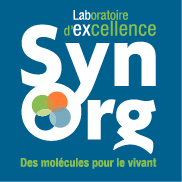LabEx SYNORG

Health and the understanding of the mechanisms underlying Life Sciences have been key issues for our societies for ages.
In most of the problems related to health and to the understanding of living organisms, chemistry and more precisely organic synthesis remains the cornerstone. Indeed health domains always need new molecules to explore the molecular space and find the drug of the future. On the other hand, new tools to characterize or understand biological mechanisms are still sought by the scientific community. In this internationally competitive area, our LABEX application SYNORG proposes to associate the four A-ranked laboratories of organic synthesis, two in Normandie regions (LCMT at Caen and COBRA at Rouen) and two in region “Centre” (ICOA at Orléans and GICC at Tours), representing more than 175 permanent staff people.
SYNORG will then be the biggest French laboratory of organic synthesis, allowing it to address, in a more efficient manner, all challenges in synthetic methodology for applications in Life Sciences and to open the way to the discovery and synthesis of new pharmacologically important scaffolds. Bringing together these four laboratories will allow this LABEX to reach the critical size to internationally compete and attract foreign researchers and students. This LABEX aims at increasing international recognition and appearing as an unavoidable partner in synthetic chemistry for Life Sciences. SYNORG will focus on 4 main axes, based on the common or complementary specificities and recognized expertise of the different partners: Heteroelements’ chemistry, Metal-mediated chemistry, Heterocyclic chemistry, Carbohydrate chemistry.
Three bottlenecks and challenges in Life Sciences could be addressed to by the methodological expertise of the SYNORG:
- Development of new synthetic methodologies and new reactions sequences leading efficiently to novel, unprecedented families of compounds.
- Innovative methods for bioconjugate chemistry and labeling techniques
- Development of environmentally friendly reaction sequences.
To reach the objectives of SYNORG, research funding will be attributed by five different manners to support original projects:
- Axes will distribute 60% of the research fundings to long-term projects covering the whole duration of the LABEX.
- Call for proposals will be launched every two years, for two out of four axes each time. An external committee composed of different experts by axes will be in charge of the selection of the original interregional projects. These calls for proposals could allow researchers from the associated laboratories to develop a common research project, for one or three years.
- Attract foreign researchers and give them the opportunity to develop an original project in collaboration with LABEX laboratories or teams. The grant would cover the salary of the foreign researcher and post-docs, along with other expenses.
- Support the formation part of the LABEX project through teachers and courses exchanges, and financial support for the creation of an international Master degree as well as seminars and summer schools for the PhDs programs.
- SYNORG will develop again relationships with companies.